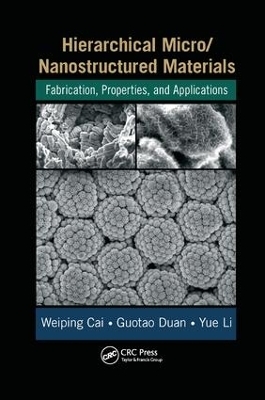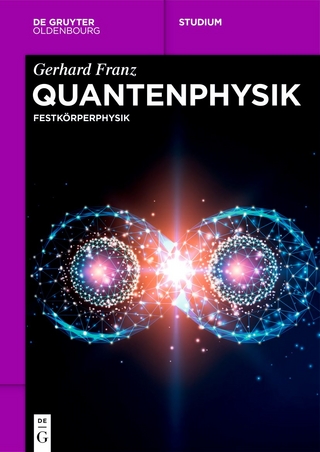
Hierarchical Micro/Nanostructured Materials
CRC Press (Verlag)
978-1-138-07467-5 (ISBN)
After a general introduction to hierarchical micro/nanostructured materials, the first section begins with a detailed discussion of the methods of mass production for hierarchical micro/nanostructured powders, including structure-directed solvothermal routes, template-etching strategies, and electrospinning technologies. It then proceeds to address structurally enhanced adsorption and photocatalytic performances.
The second section describes strategies for the fabrication of hierarchical micro/nanostructured object arrays and their devices, such as modified colloidal lithographies-based solution and electrodeposition. It also examines the structure-dependent properties and performances of the micro/nanostructured arrays, including surface wettability, optical properties, surface-enhanced Raman scattering (SERS) effects, and gas-sensing performances.
In its cutting-edge coverage, Hierarchical Micro/Nanostructured Materials: Fabrication, Properties, and Applications explores the use of hierarchical micro/nanostructured materials in environmental remediation and detection devices, commenting on future trends and applications in catalysis, integrated nanophotonics, optical devices, super-high density storage media, sensors, nanobiotechnology, SERS substrates, and more.
Weiping Cai earned a B.Sc and M.Sc in materials science from Northeast Normal University, Changchun, People’s Republic of China in 1982 and 1984, respectively. In 1997, he earned a Ph.D in materials science from Huazhong University of Science and Technology, Wuhan, People’s Republic of China. Since 1997, he has been a professor at the Institute of Solid State Physics, Chinese Academy of Sciences, Hefei. His research interests include micro/nanostructured patterns and detection devices, as well as micro/nanomaterials for environmental applications. Guotao Duan earned a Ph.D from the Institute of Solid State Physics, Chinese Academy of Sciences, Hefei in 2007, and has continued to work there. From April 2009 to March 2010, he stepped away to do postdoctoral work at the National Institute for Materials Science, Tsukuba, Japan. His current research interests focus on micro/nanofabrication, ordered micro/nanostructured arrays, and micro/nanodevices. Yue Li earned a Ph.D in condensed matter physics from the Institute of Solid State Physics, Chinese Academy of Sciences (CAS), Hefei in 2005. He later worked as a postdoctoral fellow and/or visiting scientist in the Korea Advanced Institute of Science and Technology, Daejeon, South Korea; National Institute of Advanced Industrial Science and Technology, Tsukuba, Japan; and Max Planck Institute of Colloids and Interfaces, Potsdam, Germany. Since 2011, he has served as a professor at the Institute of Solid State Physics, CAS. His research interests include the fabrications, applications, and devices of micro/nanostructured arrays based on colloidal monolayer template techniques.
General Introduction. Section I: Hierarchical Micro/Nanostructured Powders. Solvothermal Routes. Template-Etching Strategies. Electrospinning and In Situ Conversion. Structurally Enhanced Photocatalysis Properties. Structurally Enhanced Adsorption Performances for Environment. Section II: Hierarchical Micro/Nanostructured Arrays. Micro/Nanostructured Block-Built Arrays. Micro/Nanostructured Ordered Porous Arrays. Surface Wettability and Self-Cleaning Properties. Optical Properties and Devices. Gas-Sensing Devices and Structurally Enhanced Gas-Sensing Performances. Surface-Enhanced Raman Scattering Performances and Detection Applications.
| Erscheinungsdatum | 16.01.2018 |
|---|---|
| Reihe/Serie | Advances in Materials Science and Engineering |
| Zusatzinfo | 3 Tables, black and white; 311 Illustrations, black and white |
| Verlagsort | London |
| Sprache | englisch |
| Maße | 156 x 234 mm |
| Gewicht | 453 g |
| Themenwelt | Naturwissenschaften ► Biologie |
| Naturwissenschaften ► Physik / Astronomie ► Festkörperphysik | |
| Technik ► Maschinenbau | |
| Technik ► Umwelttechnik / Biotechnologie | |
| ISBN-10 | 1-138-07467-5 / 1138074675 |
| ISBN-13 | 978-1-138-07467-5 / 9781138074675 |
| Zustand | Neuware |
| Haben Sie eine Frage zum Produkt? |
aus dem Bereich


